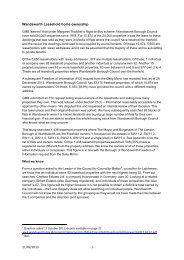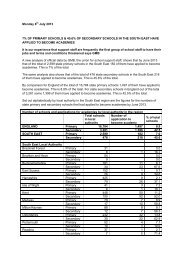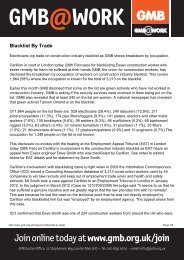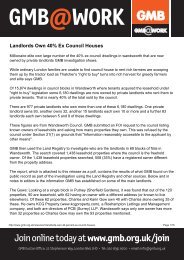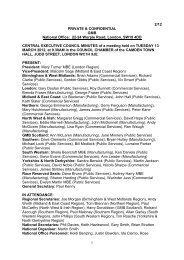6 Million UK Unpaid Carers In The West Midlands - GMB
6 Million UK Unpaid Carers In The West Midlands - GMB
6 Million UK Unpaid Carers In The West Midlands - GMB
You also want an ePaper? Increase the reach of your titles
YUMPU automatically turns print PDFs into web optimized ePapers that Google loves.
Wednesday 5 th June 2013<br />
614,888 PEOPLE IN THE WEST MIDLANDS PROVIDE UNPAID CARE EACH WEEK WITH 38.4%<br />
PROVIDING MORE THAN 20 HOURS CARE PER WEEK<br />
One in eight workers has caring responsibility and many work part time so there is also a financial impact<br />
on them so employers need to sign up to a charter that makes it easier for unpaid carers to combine paid<br />
work with their caring roles <strong>GMB</strong> Congress told<br />
A total of 614,888 people in the <strong>West</strong> <strong>Midlands</strong> provide unpaid care each week <strong>GMB</strong> Congress in Plymouth was<br />
told today. That is 11% of all residents in the <strong>West</strong> <strong>Midlands</strong>. Of these 61.6% provide between 1 and 20 hours<br />
unpaid care per week while the remaining 38.4% provide above 20 hours or more unpaid care per week.<br />
<strong>In</strong> England and Wales a total of 5,800,246 provide unpaid care each week. That is 10.3% of all residents in<br />
England and Wales. Of these 63.2% provide between 1 and 20 hours unpaid care per week while the remaining<br />
36.8% provide above 20 hours or more unpaid care per week.<br />
<strong>In</strong> Dudley a total of 37,974 people provide unpaid care each week. This is 12.1% of all residents in the area. This<br />
is the area with the highest percentage in the region. Next for the highest percentage is Solihull with 24,113<br />
people and 11.7%. <strong>The</strong>se are followed by Staffordshire with 98,832 people or 11.6%, Herefordshire with 20,676<br />
and 11.3%, Worcestershire with 63,685 and 11.2%, Shropshire with 34,260 and 11.2%, Stoke-on-Trent with<br />
27,385 and 11%, Sandwell with 33,530 and 10.9%, Wolverhampton with 27,136 and 10.9%, Warwickshire with<br />
59,240 and 10.9% and Telford and Wrekin with 17,944 and 10.8%. <strong>The</strong> figures for all 14 areas in the region are<br />
set out in the table below.<br />
<strong>The</strong>se figures are in a new report published today, 5 th June, at the <strong>GMB</strong> Congress in Plymouth which started on<br />
2 nd June. <strong>The</strong> figures are drawn from the 2011 Census of Population and are ranked by the percentage of unpaid<br />
carers in each area. <strong>GMB</strong> is the main union in the paid care sector. See Note to Editors for sources and<br />
definitions.<br />
<strong>GMB</strong> Congress comprises 500 lay <strong>GMB</strong> member delegates is in Plymouth till Thursday 6th June. Delegates are<br />
members who have been elected to represent over 620,000 members from every part of the <strong>UK</strong> and Ireland.<br />
<strong>The</strong>y are employed in every sector of the economy including the <strong>West</strong> <strong>Midlands</strong>.<br />
Table: Number of unpaid carers by area in the <strong>West</strong> <strong>Midlands</strong> and percentage providing above and below<br />
20 hours unpaid care per week<br />
Total number<br />
of unpaid<br />
carers<br />
<strong>Unpaid</strong><br />
<strong>Carers</strong> as %<br />
of total<br />
residents<br />
Provides<br />
between 1 and<br />
20 Hours of<br />
<strong>Unpaid</strong> Care a<br />
Week %<br />
Provides 20+<br />
Hours of<br />
<strong>Unpaid</strong> Care a<br />
Week %<br />
England and Wales 5,800,246 10.3 63.2 36.8<br />
Wales 370,230 12.1 57.4 42.6<br />
<strong>West</strong> <strong>Midlands</strong> 614,888 11.0 61.6 38.4<br />
rank<br />
1 Dudley 37,974 12.1 61.0 39.0
2 Solihull 24,113 11.7 66.7 33.3<br />
3 Staffordshire 98,832 11.6 64.5 35.5<br />
4 Walsall 30,632 11.4 55.5 44.5<br />
5 Herefordshire 20,676 11.3 67.7 32.3<br />
6 Worcestershire 63,685 11.2 66.8 33.2<br />
7 Shropshire 34,260 11.2 66.7 33.3<br />
8 Stoke-on-Trent 27,385 11.0 55.6 44.4<br />
9 Sandwell 33,530 10.9 53.0 47.0<br />
10 Wolverhampton 27,136 10.9 56.9 43.1<br />
11 Warwickshire 59,240 10.9 67.3 32.7<br />
12 Telford and Wrekin 17,944 10.8 57.5 42.5<br />
13 Coventry 32,101 10.1 60.6 39.4<br />
14 Birmingham 107,380 10.0 57.0 43.0<br />
Joe Morgan, <strong>GMB</strong> Regional Secretary said, “This huge hidden army of unpaid often voice-less carers saves<br />
taxpayers billions every year. <strong>In</strong> many areas there are far more unpaid carers than actual paid care<br />
providers in place. <strong>The</strong> hidden army of unpaid carers consists of predominately women.<br />
<strong>The</strong> impact of caring responsibilities has a huge impact on carer’s health. <strong>Carers</strong> often experience<br />
depression, emotional and physical exhaustion. Sleep disturbance being just one factor which impacts<br />
on carers. <strong>The</strong> number of young carers is also on the increase.<br />
<strong>The</strong>re just isn't the adequate support in place for carers. This is further compounded with the squeeze on<br />
funds. It is not just comprehensive support that these unpaid carers need but also emotional support<br />
including respite and short breaks.<br />
Approximately one in eight workers have some sort of caring responsibility. Many carers work part time<br />
so there is also a financial impact on them. Employers need to sign up to a charter that makes it easier for<br />
unpaid carers to combine paid work with their caring roles. Employment rights for carers are poor as<br />
there is very little recognition or support for such workers within a work life balance context in the<br />
workplace. Despite the anti-discrimination legislation and Equality Act 2010 we have some way to go.<br />
We now know that almost two thirds of people with dementia live in their own homes and most need<br />
round the clock care and most need help with a range of tasks including bathing and dressing. For the<br />
carer who looks after them, who also have dependent children, the impact on the carer is massive.<br />
District nurses estimate that over next few years the number of people needing care will continue to<br />
grow. So to call this a crisis is a huge understatement. <strong>The</strong> lack of funds and government reluctance to<br />
grasp the nettle cannot be allowed to continue.<br />
A radical overhaul of the current approach to paid and unpaid care is needed from society as a whole is<br />
required. That includes government and employers as well as families. <strong>Carers</strong> week is next week from
10th to 16th June and that is a good time to focus on this growing problem. Materials for carers week can<br />
be downloaded from www.carersweek.org ”<br />
Ends<br />
Contact: Joe Morgan, <strong>GMB</strong> Regional Secretary on 07794 247960 or Amanda Gearing <strong>GMB</strong> Senior Organiser on<br />
07957 265678 or Kamaljeet Jandu, <strong>GMB</strong> National Equality & <strong>In</strong>clusion Officer on 07956 237178 or <strong>GMB</strong> Press<br />
Office: 07921 289880 or 07974 251823.<br />
Notes to Editors: Sources and definitions:<br />
Office for National Statistics; Census of Population 2011, table KS301EW – Health and provision of unpaid care for England<br />
and Wales Northern Ireland Statistics and Research Agency; Census of Population 2011, table KS301NI - Health and<br />
provision of unpaid care for Northern Ireland.<br />
<strong>The</strong> data gives information about the number of providers of unpaid care and the number of hours of care they provide.<br />
A person is a provider of unpaid care if they look after or give help or support to family members, friends, neighbours or others<br />
because of long-term physical or mental ill health or disability, or problems related to old age. This does not include any<br />
activities as part of paid employment. No distinction is made about whether any care that a person provides is within their own<br />
household or outside of the household.



